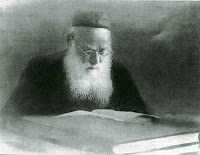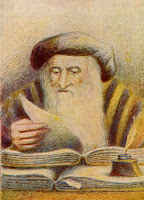In the beginning of Parshas Lech Lecha, God instructs Abraham to leave his homeland and to travel to the land that He would show him. God then blesses Abraham (Genesis 12:2):
ואעשך לגוי גדול ואברכך ואגדלה שמך והיה ברכה
And I shall make you into a great nation, and I shall bless you, and I shall make your name great, and you shall be a blessing."
On this verse, Rashi cites a midrashic interpretation from the Talmud (Pesachim 117b) that connects this verse with the opening blessing of the Amidah - the silent standing prayer which is the centerpiece of all Jewish prayer services. The blessing begins with the words, "Blessed are You, Hashem, our God and the God of our fathers, the God of Abraham, the God of Isaac, and the God of Jacob" and concludes with the words, "Blessed are You, Hashem, Shield of Abraham". It is in connection to this blessing that Rashi writes:
"ואעשך לגוי גדול" - זה שאומרים "אלקי אברהם." "ואברכך" - זהו שאומרים "אלקי יצחק." "ואגדלה שמך" - זהו שאומרים "אלקי יעקב." יכול יהיו חותמין בכולן, ת"ל "והיה ברכה" - בך חותמין ולא בהם:
"And I shall make you into a great nation" - This refers to their statement, "God of Abraham." "And I shall bless you" - This refers to their statement, "God of Isaac." "And I shall make your name great" - This refers to their statement, "God of Jacob." You might think that the blessing would conclude with all of them, the verse therefore says, "and you shall be a blessing" - meaning, with you they shall conclude, and not with them.
Many commentaries point out that the reason we describe God as the God of each of the Patriarchs individually, i.e. "the God of Abraham, the God of Isaac, and the God of Jacob", is to teach us that Isaac and Jacob did not simply accept the teachings of their father, but rather each one took the teachings of his father and developed it further. Each of the Patriarchs thereby established a relationship with God which was not simply derivative from the teachings of his father. Thus, the God of Isaac was not simply the God of his father Abraham, and the God of Jacob was not simply the God of Isaac or the God of Abraham. As Rav Avigdor Miller writes in his commentary on the Siddur (Praise My Soul p.371):
The word "G-d" is repeated for each [of the Patriarchs] because each was a pioneer and an original discoverer in the matter of coming close to G-d, in addition to continuing that which he received from his father.
 |
| Rabbi Shimon Shkop |
Rav Shimon Shkop (d.1940) discusses this idea (הובא בספר עץ הדעת עה"ת) that each of the Patriarchs took his father's teachings and developed it further, so that the teachings of Jacob represented a synthesis of the strengths of all three of the Patriarchs. Being that this is so, we would expect - as the Talmud says - that the blessing would conclude, as it begins, by naming all three of the Patriarchs. Yet this is not so; the blessing concludes only with Abraham.
Rav Shkop sees this as an allusion to the history of the Jewish people. Abraham came to know God on his own, and he passed this knowledge down to his son Isaac and his grandson Jacob. Each of these, in turn, took this knowledge and developed his own unique relationship with God. This included coming to know God independently of the teachings they had received from their fathers. Thus, in one sense, the teachings of Isaac, and even more so, the teachings of Jacob, represent a higher, more developed form of faith than that of Abraham. We would, therefore, have expected that this more sophisticated form of faith would stay with the Jewish people for all time.
Yet, explains Rav Shkop, the Sages are telling us that this is not what will happen. Rather, באחרית הימים - in the final generations before the redemption, many Jews will drift away from their ancestral faith, and when their descendants are aroused to return, they will no longer have the benefits of their tradition, and will be forced to start from the beginning, like Abraham.
Therefore, Rav Shkop says, we should not despair when we see that many Jews have drifted away from Judaism. For the Sages already predicted that this would occur, and that the Jewish people would ultimately have to return to the "simpler" faith of Abraham. The opening blessing of the Amidah concludes with Abraham alone to signal to us that the ultimate conclusion of Jewish history will depend on a return to the most basic elements of our faith, the teachings of Abraham, who taught us how to recognize the Creator on our own, even without the benefit of our ancestral traditions.


